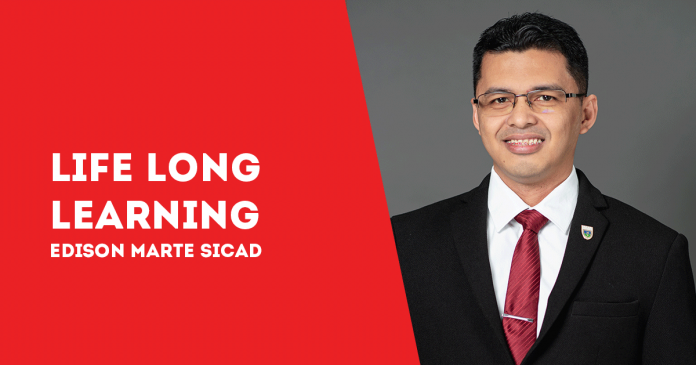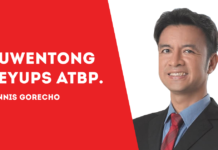
BY EDISON MARTE SICAD
MORE than two decades ago, I participated in a leadership training organized by the student council. It was held on a summer break. The student council officers had a strategic planning in preparation for the start of the new school year. We discussed about the Mission-Vision-Goals alignment of school activities and participated in a teambuilding workshop.
In one of the activities, our adviser told us to make a lifeline. He explained that as student leaders, we must have the ability to see things in a bigger perspective and plan way ahead of time. To emphasize the importance of planning, he made us draw a line and told us to place dots or interval notations that would represent our supposed significant years in the future.
Of course, I really don’t know what makes a year significant nor do I have any know-how as to how to make a year significant. At that time, all I can think of was the next day, or at most, the next week. Admittedly, I thought to myself that maybe I just didn’t have the qualities of a true student leader.
Now, after decades of zigzagged lines and dotted years of insignificance, I finally understood what significant means. And I think I also now have the ability as to how to make a year significant. Somehow, I am connecting the dots backwards to give value to my present situation.
I can see farther now—maybe more as a precaution than an ambition. And with my dizzying zigzagging journey for more than two decades, I have learned the pain of not planning well and the importance of recalibrating previous plans.
Allow me to share with you this story taken from the book The 7 Habits of Highly Effective Teens by Sean Covey. This story challenges and inspires us to take charge in choosing what to do (and not do) today in relation to what we choose to become in the decades ahead:
Just as negative self-paradigms can put limitations on us, positive self-paradigms can bring out the best in us, as the following story about the son of King Louis XVI of France illustrates:
King Louis had been taken from his throne and imprisoned. His young son, the prince, was taken by those who dethroned the king. They thought that inasmuch as the king’s son was heir to the throne, if they could destroy him morally, he would never realize the great and grand destiny that life had bestowed upon him.
They took him to a community far away, and there they exposed the lad to every filthy and vile thing that life could offer. They exposed him to foods the richness of which would quickly make him a slave to appetite. They used vile language around him constantly. They exposed him to lewd and lusting women. They exposed him to dishonor and distrust. He was surrounded twenty-four hours a day by everything that could drag the soul of a man as low as one could slip.
For over six months he had this treatment—but not once did the young lad buckle under pressure. Finally, after intensive temptation, they questioned him. Why had he not submitted himself to these things— why had he not partaken? These things would provide pleasure, satisfy his lusts, and were desirable; they were all his.
The boy said, “I cannot do what you ask, for I was born to be a king.”
To be guided by a vision of our future self can give us a new mindset that will enable us to think of ways as to how to achieve our goal. Having a plan can also develop our emotional intelligence that will make us more mature in times of difficulties.
For when we have decided and committed to make a year (or any future years) significant, we gain more “comeback” power.
It happened to me. I finished high school with no awards. During the graduation ceremony, when the names of my classmates were called and as the audience clapped and congratulated them, I told myself that this time around, when I finish college, I will receive many medals. And I did.
The interesting part here is that although I learned how to handle failure, I was not able to handle success well. So, my college interlude of success was followed by more failures.
Then I recalibrated my plans and I found ways to humble myself and at the same time to be more assertive of my priorities.
And now, I am full of gratitude for these midlife opportunities. The next 10 years would be really interesting. Yes, I have made another lifeline. I never thought that the lesson I learned in the student council training more than two decades ago would be more applicable today./PN



